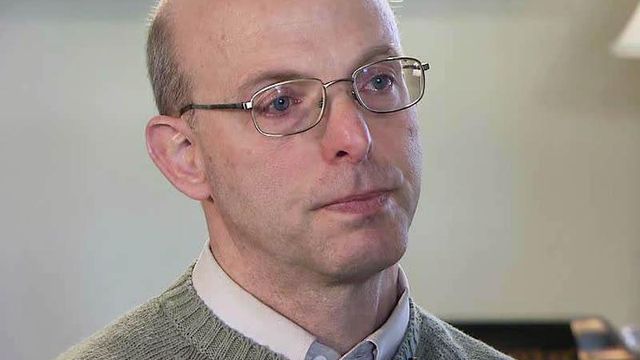Expert calls SBI blood evidence tests in Peterson case flawed
An expert in forensic sciences on Wednesday questioned the tests done by a former State Bureau of Investigation agent on blood evidence in the death of a Nortel Networks executive a decade ago.
Posted — UpdatedTim Palmbach, chairman of the Department of Forensic Science at the University of New Haven, who trains crime scene investigators, testified in a hearing to determine whether Mike Peterson will get a new murder trial.
Peterson, a Durham novelist and one-time mayoral candidate, was convicted in 2003 of the Dec. 9, 2001, beating death of his wife. Kathleen Peterson was found dead in a pool of blood at the bottom of a staircase in the couple's upscale Durham home.
His request for a new trial focuses on testimony provided during the 2003 trial by Duane Deaver, a blood analyst whom the SBI fired in January.
Palmbach, who also testified as a defense witness in Peterson's trial, said Deaver's claim that he could pinpoint where blood on the staircase came from is misleading and that the tests he conducted were flawed.
Deaver focused on only some of the blood droplets in the area and didn't disclose to jurors that there was other blood at the scene that didn't fit his findings. Also, many of Deaver's tests appeared to be used to confirm a theory rather than sort through the evidence for the most likely scenario, he said.
"One of the real no-nos and dangers in the field is you conduct a test and you stop, leaving behind other data,” he said.
During the 2003 trial, Palmbach said that the evidence in the home was consistent with Kathleen Peterson falling down the stairs. Durham County District Attorney Tracey Cline asked Wednesday if the evidence also could point to someone hitting her and causing her to fall, and he said that was a possibility.
Palmbach's testimony continued defense attorney David Rudolf's attack on Deaver's credibility.
Earlier Wednesday, Rudolf and SBI Assistant Director Erik Hooks discussed an internal report on mock exercises the agency held to prepare agents to testify in criminal trials.
A supervisor praised Deaver in the exercises for his confidence and ability to put scientific evidence into layman's terms, but he said one of Deaver's major weaknesses was a "strong bias toward the prosecution."
"That's a real problem for someone who is an expert, isn't it?" Rudolf asked Hooks, who oversees professional standards at the agency.
"Yes," Hooks replied.
Deaver was one of only two SBI agents who did a crime "re-creation" as part of his analysis, Hooks acknowledged. A Kinston attorney said Tuesday that Deaver wasn't allowed to testify about one such re-creation that involved smashing a pumpkin with a two-by-four to simulate a beating death.
Re-creations are far different than trying to reconstruct a crime scene, Palmbach said.
While a scene reconstruction generates various circumstances for testing, a re-creation sets up tests to prove a specific theory, he said. If Deaver was biased toward the prosecution in a case, that could make his theory and tests one-sided, he said.
"It’s a great concern. If they have a prosecutorial bias, they are no longer objective. They have a horse in the race," he said.
Blood spatter analysis is an inexact science at best under ideal circumstances, let alone if the testing is biased, Palmbach said.
A 2009 report by the National Academy of Sciences on the reliability of forensic sciences found more research was needed and that some analysts overstate the evidence, he said.
"They are so far out of the bounds of the methodology, it goes beyond the scope of opinion. It just absolutely should not be so," he said.
Cline tried to downplay Deaver's firing, noting that he wasn't dismissed because of the quality of his work but because of his attitude and because a state judicial panel believed he was in contempt of court in another case.
An independent review of the SBI crime lab last year found that Deaver was linked to some of the most egregious cases where blood evidence was misstated or falsely reported in about 200 criminal cases between 1987 and 2003.
Cline also disputed Hooks' testimony from Tuesday that Deaver's field experience paled when compared to the credentials he presented when testifying at Peterson's 2003 trial. An SBI list of case reports Deaver worked on might not include cases where he went into the field and didn't file a report, Hooks acknowledged.
• Credits
Copyright 2024 by Capitol Broadcasting Company. All rights reserved. This material may not be published, broadcast, rewritten or redistributed.






